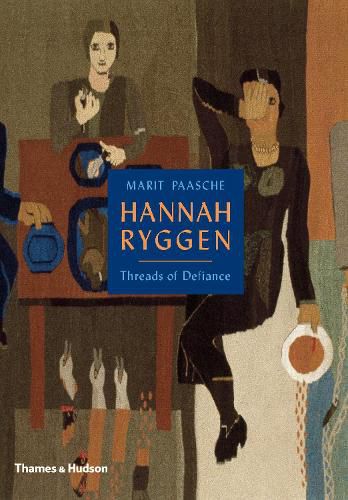Readings Newsletter
Become a Readings Member to make your shopping experience even easier.
Sign in or sign up for free!
You’re not far away from qualifying for FREE standard shipping within Australia
You’ve qualified for FREE standard shipping within Australia
The cart is loading…






The significance of Hannah Ryggen (1894-1970) as one of the most important figures in the history of Scandinavian art has only recently been recognized internationally. Beloved and renowned for her original contributions to modernist tapestry, Ryggen made radical political statements against Fascism and Nazism before and during the Second World War. Using primary sources, Ryggen expert Marit Paasche brings us a much fuller knowledge of the artist, weaving her life and work into a story that illuminates not only the artist herself, but also 20th-century art history in general. Hannah Ryggen’s visually spellbinding tapestries, made on a homemade handloom in her small farm on the remote Norwegian coast, depict a wealth of subjects: Mussolini’s Abyssinian campaign, her husband’s internment in a Nazi camp in occupied Norway, the post-war growth of nuclear power, and media coverage of the Vietnam War. At once hard-hitting and humorous, her works combine personal candour, social and political engagement and visual majesty. Paasche explores both the artist’s bold subject matter and particular balance of abstraction and figuration within the context of her life and beliefs. Including a comprehensive selection of works, this book provides an enthralling account of a remarkable, and unjustly overlooked, artist.
$9.00 standard shipping within Australia
FREE standard shipping within Australia for orders over $100.00
Express & International shipping calculated at checkout
The significance of Hannah Ryggen (1894-1970) as one of the most important figures in the history of Scandinavian art has only recently been recognized internationally. Beloved and renowned for her original contributions to modernist tapestry, Ryggen made radical political statements against Fascism and Nazism before and during the Second World War. Using primary sources, Ryggen expert Marit Paasche brings us a much fuller knowledge of the artist, weaving her life and work into a story that illuminates not only the artist herself, but also 20th-century art history in general. Hannah Ryggen’s visually spellbinding tapestries, made on a homemade handloom in her small farm on the remote Norwegian coast, depict a wealth of subjects: Mussolini’s Abyssinian campaign, her husband’s internment in a Nazi camp in occupied Norway, the post-war growth of nuclear power, and media coverage of the Vietnam War. At once hard-hitting and humorous, her works combine personal candour, social and political engagement and visual majesty. Paasche explores both the artist’s bold subject matter and particular balance of abstraction and figuration within the context of her life and beliefs. Including a comprehensive selection of works, this book provides an enthralling account of a remarkable, and unjustly overlooked, artist.